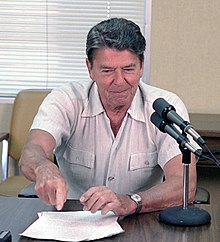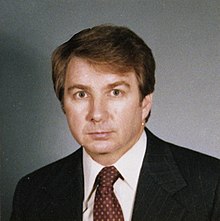 We begin bombing in five minutes
The audio leaked to the public
We begin bombing in five minutes
The audio leaked to the public
Problems playing this file? See media help.
"We begin bombing in five minutes" is the last sentence of a controversial, off-the-record joke made by U.S. President Ronald Reagan in 1984, during the Cold War. While preparing for a scheduled radio address from his vacation home in California, Reagan joked with those present about outlawing and bombing Russia. The joke was not broadcast live, but was recorded and later leaked to the public. The Soviet Union criticized the joke, as did Reagan's opponent in the 1984 United States presidential election, Walter Mondale.
Speech

At 9:06 a.m. on August 11, 1984, U.S. President Ronald Reagan made his weekly radio address from Rancho del Cielo, his ranch near Santa Barbara, California. The live address began with the president announcing his signature on the Equal Access Act: "My fellow Americans: I'm pleased to tell you that today I signed legislation that will allow student religious groups to begin enjoying a right they've too long been denied—the freedom to meet in public high schools during nonschool hours, just as other student groups are allowed to do."
Before the speech, while Reagan was joking with the National Public Radio audio engineers during a soundcheck, he riffed on his own speech, saying, "My fellow Americans, I'm pleased to tell you today that I've signed legislation that will outlaw Russia forever. We begin bombing in five minutes." This sort of levity was common for Reagan; he injected his humor into soundchecks, outtakes, and downtime throughout his careers in show business and politics.
Leak
In the minutes before Reagan gave his speech, a live feed from Rancho del Cielo was being transmitted to radio stations around the United States. Many rebroadcasters were already recording the feed to be ready for the official transmission, and thus recording Reagan's pre-speech joke. Many in the media heard Reagan's impromptu remarks as he gave them, but they were not broadcast live.
In October 1982, President Reagan had made impolitic remarks about the Polish People's Republic. As he prepared to announce his cancellation of Poland's most favored nation status (in retaliation for suppression of the Polish trade union Solidarity), Reagan called the military government "a bunch of no-good, lousy bums." This was later aired by the American Broadcasting Company and NBC News. Because of this leak, members of the White House Correspondents' Association agreed not to publish such unprepared, off-the-record presidential remarks in the future.

Both CBS News and Cable News Network recorded the 1984 joke, but kept Reagan's remarks under wraps in accordance with the White House agreement. However, rumors of the joke quickly spread, and by August 13 the quotation had been published by outlets such as Gannett. White House Press Secretary Larry Speakes declined to comment that same day, saying, "I don't talk about off-the-record stuff."
Reactions
Soviet
On August 13, the deputy minister of Soviet foreign affairs, Valentin Kamenev, told reporters, "I have nothing to say." The next day, President Reagan's leaked comments were denounced by the Soviet government, Pravda, Izvestia, and TASS as "unprecedentedly hostile", evidence of the United States' insincerity at trying to improve Soviet Union–United States relations, and as abuse of the office of the president. Western diplomats described the Soviet response as over the top, suggesting that it was an effort to give themselves more collateral at the negotiating table with the United States. U.S. officials were compelled to mollify the Soviet Union and assure the United States' Cold War adversary that "Reagan's offhand remark did not reflect White House policies or U.S. military intentions." In 2003, Moskovskij Komsomolets' Mikhail Rostovsky said that "Soviet propaganda then squeezed the maximum possible out of this joke of the state leader."
By August 14, the recording of Reagan's joke had become world news. On August 15, someone, whom the National Security Agency described to U.S. Representative Michael D. Barnes as "a wayward operator in the Soviet Far Eastern command", sent a coded message from Vladivostok that said, in part, "We now embark on military action against the U.S. forces." Japanese and U.S. intelligence decoded the message and raised the alert state in that part of the world; Soviet naval vessels in the North Pacific contacted Vladivostok in confusion. The U.S. never saw any evidence of Soviet attack preparations, and the alert status as promulgated by Vladivostok was canceled within 30 minutes.
Domestic
Reagan's poll numbers took a hit from the political gaffe, temporarily raising the hopes of Walter Mondale's supporters in the 1984 United States presidential election campaign. Mondale said of Reagan's joke, "A resident has to be very, very careful with his words." However, in the analysis of Reagan historian Craig Shirley, the leak of Reagan's joke was poorly used by the Democratic Party: " actually worked against the Democrats and for Reagan as they came across as hypersensitive, and Reagan as calm, cool and collected."
In 2010, Politico journalist Andrew Glass wrote, "Most commentators dismissed the joke as, at worst, poor taste. Nonetheless, it got geopolitical traction because it came at a time of heightened Cold War tensions between Washington and Moscow — which largely dissolved during Reagan's second term." In 2011, the Deseret News listed Reagan's microphone gaffe as his sixth-best quote, expressing surprise that it was leaked only 87 days before the election.
Other uses
Jerry Harrison, of the American rock band Talking Heads, obtained a copy of the recording and used it in the 1984 song "Five Minutes", which he performed under the name Bonzo Goes to Washington.
See also
- Bushism – Unconventional statements by George W. Bush
References
- Reagan, Ronald (August 11, 1984). Radio Address to the Nation on Congressional Inaction on Proposed Legislation (Speech). Rancho del Cielo: National Public Radio. Archived from the original on March 7, 2016. Retrieved October 22, 2018.
- ^ De Groote, Michael (February 7, 2011). "Ronald Reagan's 10 best quotes". Deseret News. ISSN 0745-4724. Archived from the original on September 23, 2018. Retrieved October 22, 2018.
- ^ Braswell, Sean (February 13, 2017). "The Cold War Joke that Had the Soviets on High Alert". Ozy. Archived from the original on October 14, 2017. Retrieved October 30, 2018.
Because when you are president, every word matters.
- ^ Jackson, Harold (August 14, 1984). "Storm as Reagan bombing joke misfires". The Guardian. ISSN 0261-3077. OCLC 60623878. Archived from the original on September 17, 2018. Retrieved October 25, 2018.
An off-air joke by Ronald Reagan causes consternation as the US president announces Russia will be bombed
- "Reagan Said to Joke Of Bombing Russia Before Radio Speech". The New York Times. August 13, 1984. p. A16. ISSN 0362-4331. OCLC 1645522. Archived from the original on March 18, 2020. Retrieved July 4, 2020.
- "Soviets assail Reagan for 'monstrous' joke". Pittsburgh Post-Gazette. Moscow. Associated Press. August 16, 1984. pp. 1, 2. ISSN 1068-624X.
- ^ Glass, Andrew (August 11, 2010). "Reagan jokes about bombing Russia, August 11, 1984". Politico. Archived from the original on October 17, 2016. Retrieved October 22, 2018.
- Ростовский, Михаил (September 30, 2003). Полет "кукурузника" [Flight of the "corn"]. Moskovskij Komsomolets (in Russian). ISSN 1562-1987. Archived from the original on October 14, 2022. Retrieved March 6, 2023.
- Kalb, Marvin; Barnes, Michael; Brokaw, Tom, NBC Nightly News, archived from the original on February 21, 2022, retrieved July 10, 2023 – via The Rachel Maddow Show
- Bowman, Dave (2001). fa fa fa fa fa fa: The Adventures of Talking Heads in the 20th Century. Bloomsbury Publishing. ISBN 0-7475-4586-3.
- 1984 controversies in the United States
- 1984 in American politics
- 1984 in California
- 1984 in international relations
- 1984 in radio
- Quotations from radio
- 1984 quotations
- Anti-Russian sentiment
- August 1984 events in the United States
- Cold War broadcasting
- Cold War history of the United States
- Diplomatic incidents
- Jokes
- Mass media-related controversies in the United States
- Political quotes
- Reagan administration controversies
- Soviet Union–United States relations
- United States military controversies

